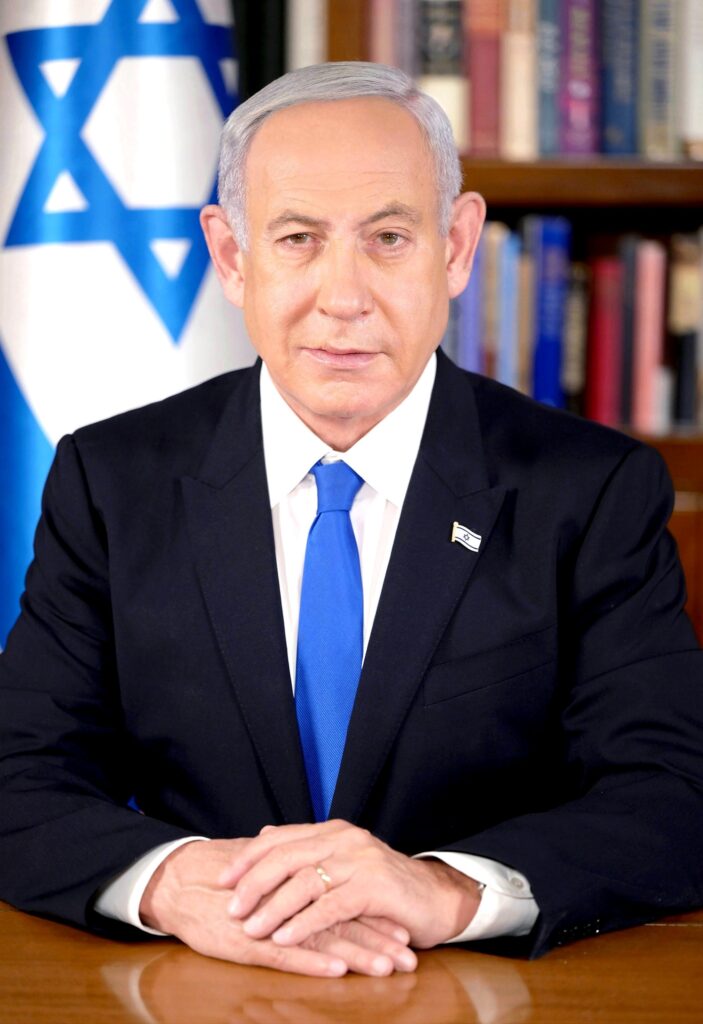Part[2]
Geography of Israel
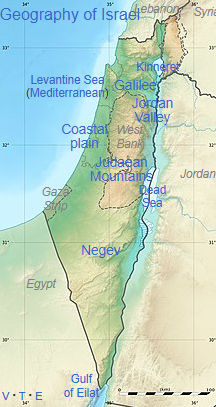
Israel is situated in the Levant region of the Fertile Crescent. The country lies at the eastern end of the Mediterranean Sea, bordered by Lebanon to the north, Syria to the northeast, Jordan and the West Bank to the east, and Egypt and the Gaza Strip to the southwest. It spans latitudes 29° to 34° N and longitudes 34° to 36° E.
The sovereign territory of Israel, based on the 1949 Armistice Agreements and excluding territories captured during the 1967 Six-Day War, covers approximately 20,770 square kilometers (8,019 sq mi), with two percent comprising water. Despite its narrow width (100 km at its widest point compared to 400 km from north to south), Israel’s exclusive economic zone in the Mediterranean is twice the land area of the country. Including East Jerusalem and the Golan Heights, the total area under Israeli law is 22,072 square kilometers (8,522 sq mi). Including the military-controlled and partially Palestinian-governed West Bank, the total area under Israeli control is 27,799 square kilometers (10,733 sq mi).
Israel’s small size belies its diverse geography, featuring the Negev desert in the south, the fertile Jezreel Valley inland, and mountain ranges in Galilee, Carmel, and the Golan in the north. The Israeli coastal plain along the Mediterranean Sea is densely populated. To the east of the central highlands lies the Jordan Rift Valley, part of the 6,500-kilometer (4,039 mi) Great Rift Valley. The Jordan River runs through the Jordan Rift Valley from Mount Hermon, through the Hulah Valley and the Sea of Galilee, to the Dead Sea, the lowest point on Earth’s surface. Further south is the Arabah, ending at the Gulf of Eilat, part of the Red Sea. Unique to the Negev and Sinai Peninsula are makhteshim, or erosion cirques, with the largest being Makhtesh Ramon at 38 km in length. Israel boasts the highest number of plant species per square meter among Mediterranean Basin countries, and it contains four terrestrial ecoregions: Eastern Mediterranean conifer-sclerophyllous-broadleaf forests, Southern Anatolian montane conifer and deciduous forests, Arabian Desert, and Mesopotamian shrub desert.

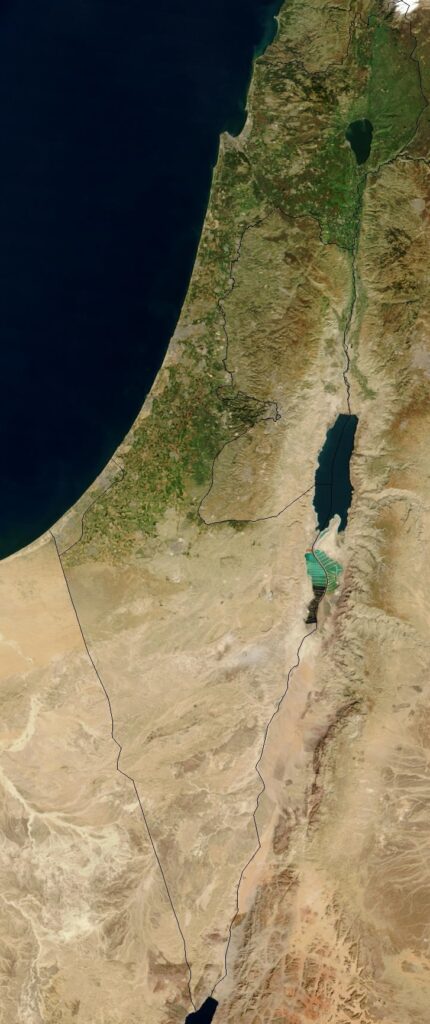
Forests covered 8.5% of Israel’s area in 2016, up from 2% in 1948, thanks to a large-scale afforestation program by the Jewish National Fund.
Tectonics and Seismicity
The Jordan Rift Valley results from tectonic movements within the Dead Sea Transform (DSF) fault system, forming the transform boundary between the African Plate to the west and the Arabian Plate to the east. The Golan Heights and all of Jordan are part of the Arabian Plate, while the Galilee, West Bank, Coastal Plain, Negev, and the Sinai Peninsula lie on the African Plate. This tectonic setting leads to relatively high seismic activity. The entire Jordan Valley segment is believed to have ruptured repeatedly, notably during major earthquakes in 749 and 1033. The accumulated slip deficit since the 1033 event could result in an earthquake of magnitude ~7.4.
The most catastrophic known earthquakes occurred in 31 BCE, 363, 749, and 1033 CE, averaging roughly every 400 years. Destructive earthquakes causing significant loss of life occur approximately every 80 years. Despite stringent construction regulations and recently built structures being earthquake-resistant, as of 2007, many public buildings and 50,000 residential buildings did not meet new standards and were “expected to collapse” in a strong earthquake.
Climate of Israel
Israel experiences a wide range of temperatures, particularly in the winter months. Coastal areas like Tel Aviv and Haifa enjoy a Mediterranean climate characterized by cool, rainy winters and long, hot summers. Beersheba and the Northern Negev exhibit a semi-arid climate with hot summers, cool winters, and fewer rainy days. The Southern Negev and Arava regions feature a desert climate with very hot, dry summers and mild winters with minimal rainfall. One of the highest temperatures recorded globally outside Africa and North America, 54°C (129°F), was documented in 1942 at Tirat Zvi kibbutz in the northern Jordan River valley. Mountainous areas can be cold and windy, with elevations above 750 meters (2,460 ft), such as Jerusalem, typically receiving at least one snowfall annually. Rainfall is rare from May to September.
Israel’s unique geographical location between temperate and tropical zones results in four distinct phytogeographic regions, contributing to its rich biodiversity. The country is home to 2,867 known plant species, with at least 253 being introduced and non-native. Israel also boasts 380 nature reserves.
Given its limited water resources, Israel has pioneered various water-saving technologies, such as drip irrigation. The abundant sunlight makes Israel a leader in solar energy usage per capita, with nearly every household utilizing solar panels for water heating. The Israeli Ministry of Environmental Protection has indicated that climate change will significantly impact all areas of life, especially affecting vulnerable populations.
Government and Politics
Israel operates under a parliamentary system with proportional representation and universal suffrage. The prime minister, usually the leader of the largest party, is a member of parliament supported by a parliamentary majority and serves as the head of government and cabinet. The president, serving as the head of state, has limited and largely ceremonial duties.
The Knesset, Israel’s 120-member parliament, governs the country. Membership is based on proportional representation of political parties, with a 3.25% electoral threshold, often resulting in coalition governments. Residents of Israeli settlements in the West Bank are eligible to vote. Following the 2015 election, settlers made up 8% of the Knesset’s members. Parliamentary elections occur every four years, but unstable coalitions or no-confidence votes can lead to earlier elections. The first Arab-led party was established in 1988, and as of 2022, Arab-led parties hold about 10% of the Knesset seats. The Basic Law: The Knesset (1958) and its amendments prevent a party list from running if its objectives or actions include the “negation of the existence of the State of Israel as the state of the Jewish people.”
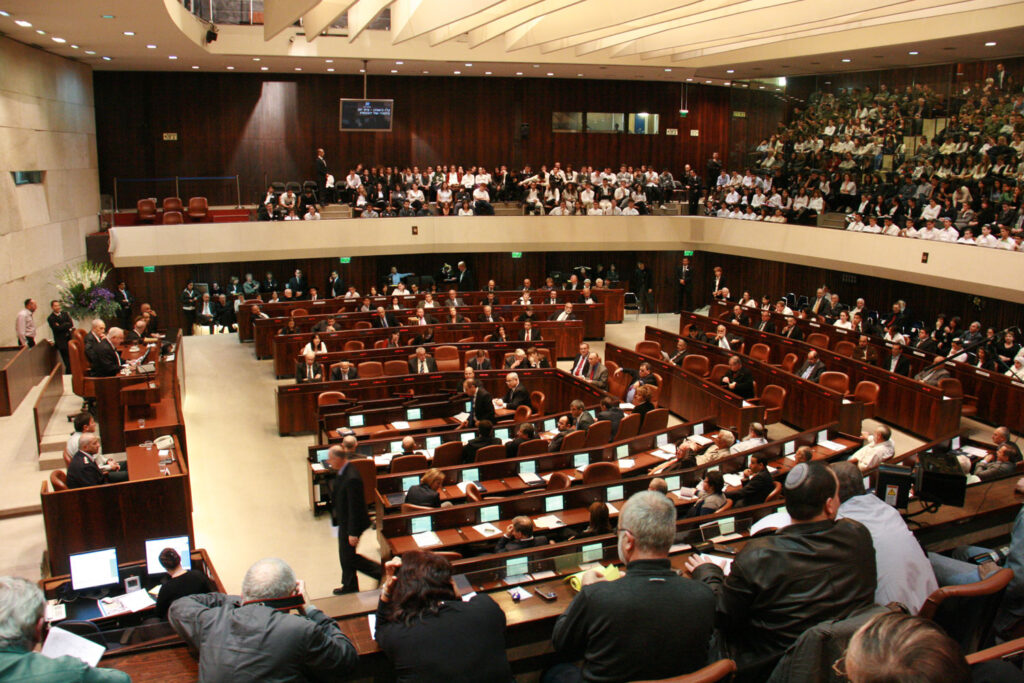
Israel’s Basic Laws function as an uncodified constitution. These laws define Israel as a Jewish and democratic state and the nation-state exclusively of the Jewish people. In 2003, the Knesset began drafting an official constitution based on these laws.
While Israel has no official religion, its definition of a “Jewish and democratic” state creates a strong connection with Judaism. On 19 July 2018, the Knesset passed a Basic Law characterizing Israel as the “Nation-State of the Jewish People,” with Hebrew as its official language and Arabic given a “special status.” This law grants Jews unique rights to national self-determination and views the development of Jewish settlement as a national interest, empowering the government to encourage and implement this interest.
Israeli Citizenship Law
The two primary pieces of legislation relating to Israeli citizenship are the 1950 Law of Return and the 1952 Citizenship Law. The Law of Return grants Jews the unrestricted right to immigrate to Israel and obtain Israeli citizenship. Individuals born within the country receive birthright citizenship if at least one parent is a citizen.
Israeli law defines Jewish nationality as distinct from Israeli nationality, and the Supreme Court of Israel has ruled that an Israeli nationality does not exist. A Jewish national is defined as any person practicing Judaism and their descendants. Since 2018, legislation has defined Israel as the nation-state of the Jewish people.
Israeli-occupied territories
In 1967, following the Six-Day War, Israel captured and occupied the West Bank, including East Jerusalem, the Gaza Strip, and the Golan Heights. Israel also captured the Sinai Peninsula, but it was returned to Egypt as part of the 1979 Egypt–Israel peace treaty. From 1982 to 2000, Israel occupied part of southern Lebanon, known as the Security Belt. Since these captures, Israeli settlements and military installations have been built in all these areas except Lebanon.
The Golan Heights and East Jerusalem have been incorporated into Israel under Israeli law, though not under international law. Israel has applied civilian law to these areas, granting inhabitants permanent residency status and the ability to apply for citizenship. The UN Security Council has declared the annexations “null and void” and continues to view these territories as occupied. The status of East Jerusalem remains a contentious issue in Israeli-Palestinian negotiations.
The West Bank, excluding East Jerusalem, is referred to in Israeli law as the Judea and Samaria Area. Approximately 400,000 Israeli settlers live there and are considered part of Israel’s population, having Knesset representation and being subject to Israeli civil and criminal laws. However, the land itself is not considered part of Israel, as the territory has not been annexed. Israeli political opposition to annexation is mainly due to the potential “demographic threat” of incorporating the West Bank’s Palestinian population into Israel. The West Bank remains under direct Israeli military rule outside of settlements, and Palestinians there cannot become Israeli citizens. The international community does not recognize Israeli sovereignty in the West Bank and views it as the longest military occupation in modern history. The West Bank was annexed by Jordan in 1950, recognized only by Britain, and later ceded to the PLO. The population mainly consists of Palestinians, including refugees from the 1948 Arab–Israeli War. Since the Israel–PLO letters of recognition in 1993, most Palestinians in these areas have been under the jurisdiction of the Palestinian Authority, with Israel retaining military control during periods of unrest. In response to attacks during the Second Intifada, Israel began constructing the Israeli West Bank barrier, with about 13% built on the Green Line or in Israel and 87% inside the West Bank.

Israel’s claim of universal suffrage has been questioned due to its blurred territorial boundaries and the extension of voting rights to Israeli settlers in occupied territories while denying them to their Palestinian neighbors, leading to allegations of ethnocracy.
The Gaza Strip is considered a “foreign territory” under Israeli law. Israel and Egypt maintain a land, air, and sea blockade of Gaza. After occupying Gaza in 1967, Israel removed its settlers and forces in 2005 but continues to control its airspace and waters. The international community, including humanitarian organizations and UN bodies, considers Gaza to remain occupied. Following Hamas’s 2007 takeover of Gaza, Israel tightened control over Gaza’s crossings, limiting movement except for isolated humanitarian cases. Gaza also shares a border with Egypt, governed by an agreement between Israel, the EU, and the PA. The application of democracy to Israeli citizens and the selective application in Israeli-controlled Palestinian territories has faced criticism.
International Opinion
The International Court of Justice (ICJ), in its 2004 advisory opinion on the legality of the construction of the Israeli West Bank barrier, stated that the lands captured by Israel during the Six-Day War, including East Jerusalem, are occupied territories. The ICJ found that building the wall within the occupied Palestinian territory violated international law. Most negotiations regarding these territories have been based on UN Security Council Resolution 242, which emphasizes “the inadmissibility of the acquisition of territory by war” and calls on Israel to withdraw from occupied territories in exchange for the normalization of relations with Arab states (“Land for peace”). Israel has faced criticism for systematic and widespread human rights violations in the occupied territories, including the occupation itself and war crimes against civilians. Allegations include violations of international humanitarian law, as noted by the UN Human Rights Council. The U.S. State Department has described reports of significant human rights abuses against Palestinians as “credible” both within Israel and the occupied territories. Amnesty International and other NGOs have documented mass arbitrary arrests, torture, unlawful killings, systemic abuses, impunity, and the denial of the right to Palestinian self-determination. Prime Minister Netanyahu has defended Israel’s security forces, arguing they protect innocents from terrorists and criticizing the perceived lack of concern about human rights violations committed by “criminal killers.”
The international community widely regards Israeli settlements in the occupied territories as illegal under international law. United Nations Security Council Resolution 2334 (passed in 2016) states that Israel’s settlement activity constitutes a “flagrant violation” of international law and demands that Israel cease such activity and fulfill its obligations as an occupying power under the Fourth Geneva Convention. A United Nations special rapporteur concluded that the settlement program was a war crime under the Rome Statute. Amnesty International found that the settlement program constituted an illegal transfer of civilians into occupied territory and “pillage,” which is prohibited by the Hague Conventions and Geneva Conventions, as well as being a war crime under the Rome Statute.
Apartheid Accusations
Israel’s treatment of Palestinians in the occupied territories has led to widespread accusations of apartheid, a crime against humanity under the Rome Statute and the International Convention on the Suppression and Punishment of the Crime of Apartheid. A 2021 survey by The Washington Post of scholars and academic experts on the Middle East found an increase from 59% to 65% of scholars describing Israel as a “one-state reality akin to apartheid.” This claim has been supported by Israeli human rights organization B’Tselem and international human rights organizations such as Amnesty International and Human Rights Watch. Israeli human rights organization Yesh Din has also accused Israel of apartheid. Amnesty’s claim was criticized by politicians and representatives from Israel and its closest allies, including the US, the UK, the European Commission, Australia, the Netherlands, and Germany. However, the accusations were welcomed by Palestinians, representatives from other states, and organizations such as the Arab League. In 2022, Michael Lynk, a Canadian law professor appointed by the UN Human Rights Council, said that the situation met the legal definition of apartheid and concluded: “Israel has imposed upon Palestine an apartheid reality in a post-apartheid world.” Subsequent reports from his successor, Francesca Albanese, and the Permanent United Nations Fact Finding Mission on the Israel-Palestine conflict chair Navi Pillay echoed this opinion.
In February 2024, the ICJ held public hearings regarding the legal consequences of Israel’s policies and practices in the occupied Palestinian territory, including East Jerusalem. During the hearings, 24 states and three international organizations stated that Israeli practices amount to a breach of the prohibition of apartheid and/or amount to prohibited acts of racial discrimination.
Foreign Relations

Israel maintains diplomatic relations with 165 UN member states, as well as the Holy See, Kosovo, the Cook Islands, and Niue. It has 107 diplomatic missions, though it has no diplomatic relations with most Muslim countries. Six out of the twenty-two nations in the Arab League have normalized relations with Israel. Israel remains formally at war with Syria and Lebanon, a status dating back to 1948 and the end of the Lebanese Civil War in 2000, respectively, with no agreed-upon borders by treaty.

Despite the peace treaty with Egypt, Israel is still widely considered an enemy among Egyptians. Iran withdrew its recognition of Israel during the Islamic Revolution. Israeli citizens cannot visit Syria, Lebanon, Iraq, Saudi Arabia, and Yemen without permission from the Ministry of the Interior. Following the 2008–09 Gaza War, Mauritania, Qatar, Bolivia, and Venezuela suspended political and economic ties with Israel, though Bolivia renewed ties in 2019.
The United States and the Soviet Union were the first countries to recognize Israel. Diplomatic relations with the Soviet Union were broken in 1967 following the Six-Day War and renewed in October 1991. The United States considers Israel its “most reliable partner in the Middle East,” based on “common democratic values, religious affinities, and security interests.” Since 1967, the US has provided $68 billion in military assistance and $32 billion in grants to Israel, the most of any country until 2003. Most Americans have consistently held favorable views of Israel. The UK is seen as having a “natural” relationship with Israel due to the Mandate for Palestine. By 2007, Germany had paid 25 billion euros in reparations to the Israeli state and individual Holocaust survivors. Israel is included in the EU’s European Neighbourhood Policy.
Turkey, which recognized Israel in 1949, did not establish full diplomatic relations until 1991 but has cooperated with Israel since. Pressure from Arab and Muslim states has sometimes tempered Turkey’s relationship with Israel. Relations between Turkey and Israel soured after the 2008–09 Gaza War and the Gaza flotilla raid. Conversely, relations between Greece and Israel have improved since 1995. They have a defense cooperation agreement, and in 2010, the Israeli Air Force hosted Greece’s Hellenic Air Force in a joint exercise. The Cyprus-Israel oil and gas explorations, particularly the Leviathan gas field, are significant for Greece due to its strong links with Cyprus. Cooperation in the EuroAsia Interconnector, the world’s longest submarine power cable, has strengthened Cyprus-Israel relations.
Azerbaijan is one of the few majority-Muslim countries to develop strategic and economic relations with Israel. Kazakhstan also has an economic and strategic partnership with Israel. India established full diplomatic ties with Israel in 1992 and has since developed a strong military, technological, and cultural partnership. India is the largest customer of Israeli military equipment, with Israel being India’s second-largest military partner after Russia. Ethiopia is Israel’s main ally in Africa due to common political, religious, and security interests.
Foreign Aid
Israel has a history of providing emergency foreign aid and humanitarian responses to disasters worldwide. Its foreign aid program began in 1955 in Burma, later shifting focus to Africa. Israel’s humanitarian efforts officially started in 1957 with the establishment of Mashav, the Agency for International Development Cooperation. While Israel’s aid initially represented a small percentage of total aid to Africa, it effectively created goodwill until relations soured after the 1967 war. The aid program then shifted focus to Latin America. Since the late 1970s, Israel’s foreign aid has gradually decreased, though in recent years, it has tried to reestablish aid to Africa. Additional Israeli humanitarian and emergency response groups, including Israel, ZAKA, The Fast Israeli Rescue and Search Team, Israeli Flying Aid, Save a Child’s Heart, and Latet, work with the government. Between 1985 and 2015, Israel sent 24 delegations of the IDF search and rescue unit, the Home Front Command, to 22 countries. Currently, Israel ranks low among OECD nations in foreign aid, spending less than 0.1% of its GNI on development assistance. The country ranked 38th in the 2018 World Giving Index.
Military
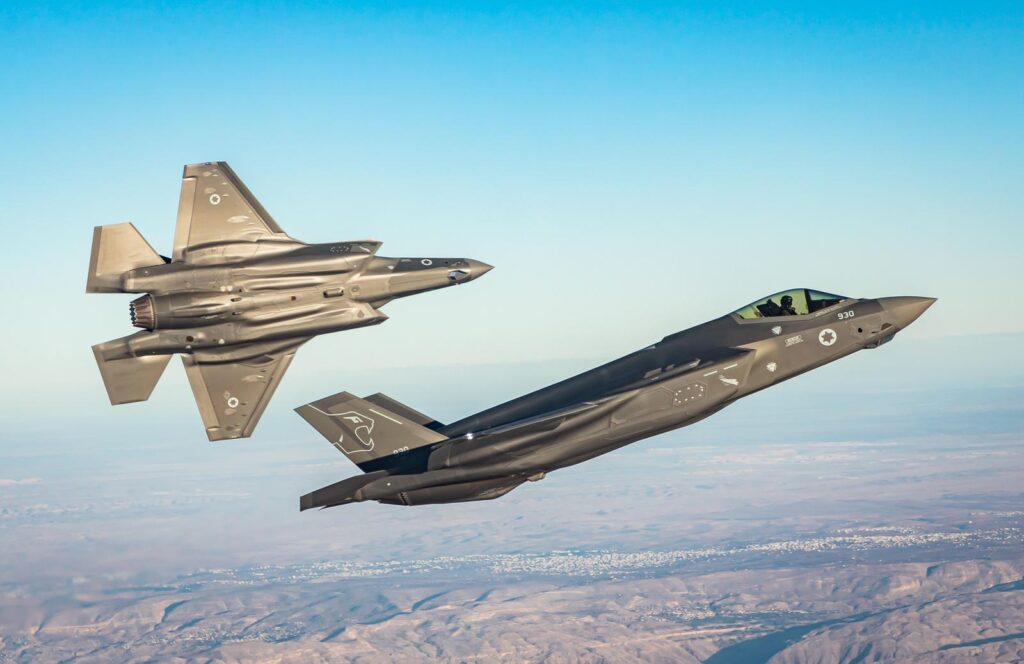
The Israel Defense Forces (IDF) is the sole military wing of the Israeli security forces and is headed by its Chief of General Staff, the Ramatkal, subordinate to the Cabinet. The IDF consists of the army, air force, and navy. It was founded during the 1948 Arab–Israeli War by consolidating paramilitary organizations—chiefly the Haganah. The IDF also draws upon the resources of the Military Intelligence Directorate (Aman). The IDF has been involved in several major wars and border conflicts, making it one of the most battle-trained armed forces in the world.

Most Israelis are conscripted at age 18. Men serve two years and eight months and women two years. Following mandatory service, Israeli men join the reserve forces and usually do up to several weeks of reserve duty every year until their forties. Most women are exempt from reserve duty. Arab citizens of Israel (except the Druze) and those engaged in full-time religious studies are exempt, although the exemption of yeshiva students has been a source of contention. An alternative for those who receive exemptions on various grounds is Sherut Leumi, or national service, which involves a program of service in social welfare frameworks. A small minority of Israeli Arabs also volunteer in the army. As a result of its conscription program, the IDF maintains approximately 176,500 active troops and 465,000 reservists, giving Israel one of the world’s highest percentages of citizens with military training.
The military relies heavily on high-tech weapons systems designed and manufactured in Israel as well as some imports. The Arrow missile is one of the world’s few operational anti-ballistic missile systems. The Python air-to-air missile series is often considered one of the most crucial weapons in its military history. Israel’s Spike missile is one of the most widely exported anti-tank guided missiles in the world. Israel’s Iron Dome anti-missile air defense system gained worldwide acclaim after intercepting hundreds of rockets fired by Palestinian militants from the Gaza Strip. Since the Yom Kippur War, Israel has developed a network of reconnaissance satellites. The Ofeq program has made Israel one of seven countries capable of launching such satellites.
Israel is widely believed to possess nuclear weapons and, per a 1993 report, chemical and biological weapons of mass destruction. Israel has not signed the Treaty on the Non-Proliferation of Nuclear Weapons and maintains a policy of deliberate ambiguity toward its nuclear capabilities. The Israeli Navy’s Dolphin submarines are believed to be armed with nuclear missiles offering second-strike capability. Since the Gulf War in 1991, all homes in Israel are required to have a reinforced security room, Merkhav Mugan, impermeable to chemical and biological substances.
Since Israel’s establishment, military expenditure has constituted a significant portion of the country’s gross domestic product, peaking at 30.3% of GDP in 1975. In 2021, Israel ranked 15th in the world by total military expenditure, with $24.3 billion, and 6th by defense spending as a percentage of GDP, with 5.2%. Since 1974, the United States has been a particularly notable contributor of military aid. Under a memorandum of understanding signed in 2016, the U.S. is expected to provide the country with $3.8 billion per year, or around 20% of Israel’s defense budget, from 2018 to 2028. Israel ranked 9th globally for arms exports in 2022. The majority of Israel’s arms exports are unreported for security reasons. Israel is consistently rated low in the Global Peace Index, ranking 134th out of 163 nations in 2022.
Legal System
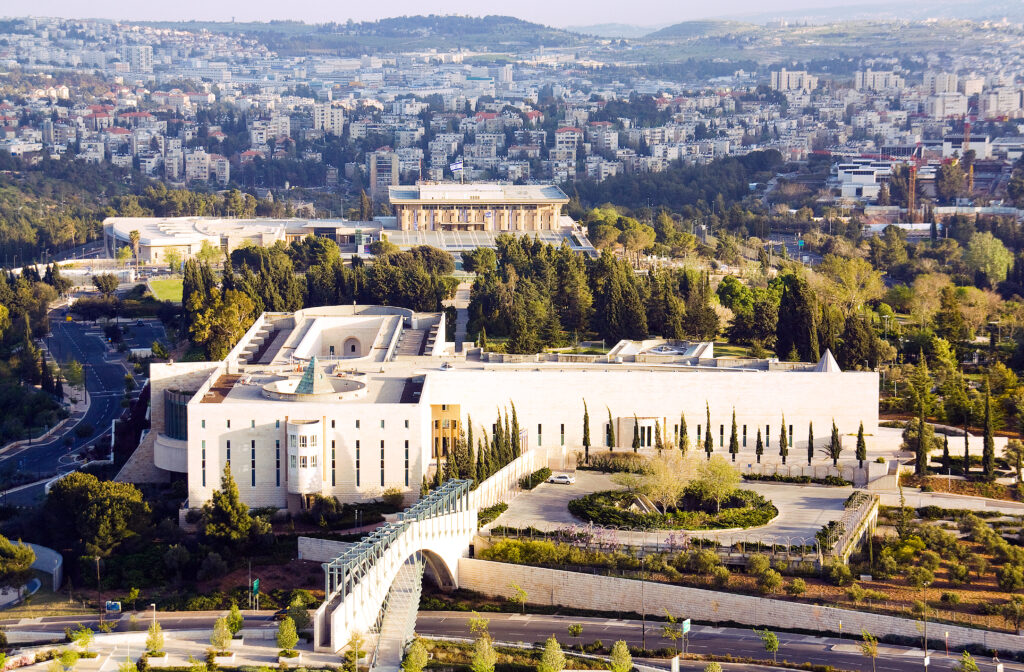
Israel has a three-tier court system. At the lowest level are magistrate courts, situated in most cities across the country. Above them are district courts, serving as both appellate courts and courts of first instance; they are situated in five of Israel’s six districts. The third and highest tier is the Supreme Court, located in Jerusalem; it serves a dual role as the highest court of appeals and the High Court of Justice. In the latter role, the Supreme Court rules as a court of first instance, allowing individuals, both citizens and non-citizens, to petition against the decisions of state authorities.
Israel’s legal system combines three legal traditions: English common law, civil law, and Jewish law. It is based on the principle of stare decisis (precedent) and is an adversarial system. Court cases are decided by professional judges with no role for juries. Marriage and divorce are under the jurisdiction of the religious courts: Jewish, Muslim, Druze, and Christian. The election of judges is carried out by a selection committee chaired by the justice minister. Israel’s Basic Law: Human Dignity and Liberty seeks to defend human rights and liberties in Israel. The United Nations Human Rights Council and Israeli human rights organization Adalah have highlighted that this law does not contain a general provision for equality and non-discrimination. As a result of “Enclave law,” large portions of Israeli civil law are applied to Israeli settlements and Israeli residents in the occupied territories.
[Stay tuned as we continue this journey together in the next blog. We appreciate your patience and can’t wait to share more with you soon!]


